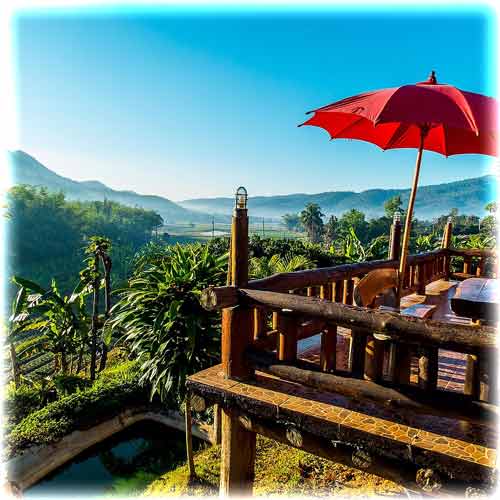Living in Thailand with Your Thai Partner: Expat & Retirement Guide
You’ve found love with a wonderful Thai woman, navigated the complexities of cross-cultural dating (dating guide), perhaps even married in Thailand. While bringing her to Europe is one option (see EU Visa Guide), many couples consider another path: the European partner moving to Thailand. The allure of a lower cost of living, tropical climate, rich culture, and of course, being with your partner, makes Thailand an attractive destination for expats and retirees.
However, relocating requires careful planning. This comprehensive guide provides European men with essential information on living long-term in Thailand with their Thai partner. We’ll cover crucial topics like visa options (Marriage and Retirement Visas), the cost of living, healthcare, accommodation, working possibilities, and the realities of daily life and integration as an expat in the Land of Smiles (learn about Thailand). Understanding these practicalities is key to making a smooth and successful transition.

Considering a Move to Thailand?
Get the essential information on visas, cost of living, and daily life for expats.
Why Live in Thailand with Your Thai Partner?
Many factors draw European men to build a life in Thailand with their Thai spouse:
- Be Together: Eliminates the challenges and costs of long-distance relationships or complex European visa processes.
- Lower Cost of Living: Generally, daily expenses (food, transport, accommodation outside prime Bangkok areas) are significantly lower than in most of Western Europe, stretching pensions or savings further.
- Warm Climate: Year-round tropical weather appeals to many escaping colder European climates.
- Rich Culture & Lifestyle: Delicious food, friendly people (“Land of Smiles”), beautiful scenery, vibrant traditions (explore Thai culture).
- Partner’s Comfort & Support System: Your partner remains close to her family, friends, and cultural roots, which can ease her long-term happiness and reduce homesickness.
- Accessible Healthcare: Thailand has a good standard of private healthcare, especially in major cities, often at lower costs than in Europe (though insurance is crucial).
- Retirement Hub: Thailand actively welcomes foreign retirees through specific visa programs (retirement info).
Long-Term Visa Options for Living in Thailand
Staying long-term requires the correct visa, usually obtained after entering on an initial visa (like a Tourist Visa or Non-Immigrant ‘O’ visa obtained abroad) and then extending or converting within Thailand. The two main options for partners of Thai citizens are:
1. Extension of Stay Based on Marriage (“Marriage Visa”)
- Who Qualifies: Foreign men legally married to a Thai citizen.
- Process Overview: Typically involves entering Thailand on a Non-Immigrant ‘O’ Visa (based on marriage, obtained from a Thai embassy/consulate outside Thailand) or converting another visa type within Thailand (more complex). Then, applying for a 1-year extension of stay at a local Thai Immigration office, renewable annually.
- Key Requirements (Subject to Change – Verify with Thai Immigration):
- Valid Passport & Non-Immigrant ‘O’ Visa (or permitted conversion).
- Proof of Legal Marriage (Thai Marriage Certificate).
- Financial Proof: EITHER
- Income Requirement: Proof of monthly income (e.g., pension, overseas earnings transferred to Thailand) of at least 40,000 THB per month. OR
- Savings Requirement: At least 400,000 THB held in a Thai bank account for a specified period (usually 2-3 months) prior to application/renewal.
(Amounts are approximate and subject to change – check official sources!)
- Proof of Residence in Thailand (e.g., rental agreement).
- Photos showing the couple together at their residence.
- Potentially other documents depending on the immigration office (e.g., children’s birth certificates if applicable).
- Renewal: Requires meeting the financial and documentation requirements annually.
- Work Rights: This visa extension itself does NOT automatically grant the right to work. A separate Work Permit must be obtained (see Work section below).
2. Extension of Stay Based on Retirement (“Retirement Visa”)
- Who Qualifies: Foreigners aged 50 years or older who meet specific financial requirements and do not intend to work in Thailand. Being married to a Thai citizen is not a requirement for this visa type itself, but it’s a common option for older men with Thai partners. (More retirement details).
- Process Overview: Similar to the marriage extension – often involves entering on a Non-Immigrant ‘O-A’ (Retirement) visa obtained abroad, or a Non-Immigrant ‘O’ visa, and then applying for a 1-year extension based on retirement, renewable annually.
- Key Requirements (Subject to Change – Verify with Thai Immigration):
- Age 50 or over.
- Valid Passport & appropriate Non-Immigrant Visa.
- Financial Proof: EITHER
- Income Requirement: Proof of monthly income (e.g., pension) of at least 65,000 THB per month. OR
- Savings Requirement: At least 800,000 THB held in a Thai bank account for a specified period (usually 2-3 months) prior to application/renewal. OR
- Combination: A mix of annual income + savings in a Thai bank account totaling at least 800,000 THB.
(Amounts are approximate and subject to change – check official sources!)
- Proof of Thai Health Insurance (mandatory requirement with specific coverage levels introduced in recent years).
- Proof of Residence in Thailand.
- Renewal: Requires meeting the age, financial, and insurance requirements annually.
- Work Rights: Strictly prohibited. This visa is for retirees who do not intend to seek employment.
Important Notes:
- 90-Day Reporting: Holders of long-term extensions must report their address to Immigration every 90 days.
- Re-Entry Permits: To leave and re-enter Thailand without invalidating your extension, you need a Re-Entry Permit (single or multiple).
- Official Sources: Visa rules change. Always consult the official Thai Immigration Bureau website or the Thai embassy/consulate in your home country for the latest, definitive requirements.

Cost of Living in Thailand: A Realistic Budget
While generally cheaper than Europe, the cost of living varies greatly depending on location and lifestyle. Bangkok and popular tourist islands (Phuket, Samui) are significantly more expensive than northern cities (like Chiang Mai) or rural areas.
Estimated Monthly Budget for a Couple (Mid-Range Lifestyle):
- Accommodation (Rent):
- Modest apartment outside central Bangkok/tourist hubs: €250 – €500 (10k – 20k THB)
- Comfortable condo in Bangkok/Phuket or house in provinces: €500 – €1,000+ (20k – 40k+ THB)
- Food:
- Eating mainly local food (street food, local restaurants, home cooking): €200 – €400 (8k – 16k THB)
- Mix of local and Western food, regular dining out: €400 – €700+ (16k – 28k+ THB)
- Utilities: Electricity (AC is a major factor), water, internet, phone: €75 – €150+ (3k – 6k+ THB)
- Transportation: Motorbike running costs, public transport, occasional taxis/Grab: €50 – €150+ (2k – 6k+ THB)
- Healthcare/Insurance: Depends heavily on plan: €50 – €200+ per person (for decent private coverage).
- Entertainment & Personal Items: Varies greatly: €100 – €300+ (4k – 12k+ THB)
- Visa Runs/Renewals (Annualized): €20 – €50 (Factor in annual visa fees, travel for reporting, etc.)
Overall Monthly Estimate (Couple, Mid-Range): €750 (very frugal, outside major cities) to €1,500 – €2,500+ (comfortable life in city/tourist area).
Note: This excludes initial setup costs (deposits, furniture), large purchases (car), extensive travel within/outside Thailand, or potential family support costs discussed in our Sin Sod & Finances Guide.
Finding Accommodation in Thailand
Securing a place to live is a top priority when relocating.
- Renting (Most Common for Expats):
- Options: Range from basic unfurnished apartments to fully furnished condos in modern buildings with pools and gyms, or houses (more common outside central cities).
- Finding Rentals: Online property portals (DDProperty, Hipflat, FazWaz), local real estate agents, Facebook groups, or simply walking around neighborhoods and looking for “For Rent” signs.
- Process: Typically requires a deposit (usually 2 months’ rent) plus the first month’s rent upfront. Lease agreements are usually for 1 year.
- Buying Property (Complex for Foreigners):
- Condominiums: Foreigners can legally own condominiums freehold (directly in their name), provided that foreign ownership in the entire building does not exceed 49%.
- Land and Houses: Foreigners generally cannot own land directly in their name. Common workarounds include:
- Long-term leases (up to 30 years, potentially renewable).
- Setting up a Thai company (complex, requires significant investment and Thai shareholders, legal advice essential).
- Buying land/house in your Thai spouse’s name (Risky! Requires strong trust and potentially legal agreements like a usufruct to protect your right to live there. Seek legal advice).
- Recommendation: Renting is often simpler and safer, especially initially. If considering buying, consult reputable lawyers specializing in Thai property law for foreigners.
Healthcare System Overview for Expats
Thailand offers good quality healthcare, particularly in private hospitals in major cities, but understanding access and costs is vital.
- Public Hospitals: Available to everyone, including foreigners, at lower costs. However, can be crowded, involve long waits, and English proficiency among staff may be limited outside tourist areas. Quality varies significantly.
- Private Hospitals: Offer high standards of care (often internationally accredited in Bangkok, Chiang Mai, Phuket), modern facilities, English-speaking staff, and shorter wait times. Significantly more expensive than public hospitals.
- Health Insurance is ESSENTIAL: As an expat, you generally won’t be covered by Thai social security (unless working legally with contributions). Private health insurance is crucial to cover costs, especially for private hospitals where even minor treatments can be expensive.
- Mandatory for Retirement Visa extensions.
- Choose a plan with adequate coverage (inpatient, outpatient, emergency evacuation). Options include international providers (Cigna, Bupa, Allianz) or local Thai insurers.
- Costs vary based on age, coverage level, deductible (€50 – €200+ per month per person).
- Clinics & Pharmacies: Numerous private clinics and pharmacies offer accessible care for minor ailments at reasonable costs. Many medications available over-the-counter.
Banking and Finances for Expats
Managing money is a key part of expat life.
- Opening a Thai Bank Account: Generally straightforward for foreigners residing long-term (with proof of address, passport, and visa/extension). Being married to a Thai citizen can sometimes facilitate the process. Major banks include Bangkok Bank, Kasikorn Bank, SCB.
- Transferring Funds: Transferring money from your European bank account is necessary for visa requirements (income/savings proof) and living expenses. Use reputable international transfer services (like Wise, Remitly, or bank transfers) for better exchange rates than withdrawing large sums from ATMs.
- ATMs & Payments: ATMs are widely available. Credit/debit cards are accepted in larger establishments, but cash is still essential for smaller shops, markets, and street food. PromptPay (QR code payment linked to bank accounts) is very common locally.
- Taxes: If you reside in Thailand for 180 days or more in a calendar year, you may be considered a tax resident. Income earned *within* Thailand is generally taxable. Tax treaties between Thailand and European countries usually prevent double taxation on income like pensions, but rules vary. Consult a tax advisor familiar with expat situations.
Working or Starting a Business in Thailand
Finding employment or running a business legally requires specific permissions.
- Work Permit is Mandatory: Having a Marriage or Retirement visa extension does NOT automatically allow you to work. To work legally (even volunteer work or part-time), you need a separate Work Permit sponsored by a Thai employer.
- Obtaining a Work Permit: The process is usually initiated by the employer. It involves proving the job cannot easily be filled by a Thai national, meeting company requirements (capitalization, Thai-to-foreign employee ratio), and holding the correct Non-Immigrant visa (usually Non-Immigrant ‘B’ for business, though sometimes possible with Non-Immigrant ‘O’ based on marriage under specific conditions). It’s a complex process.
- Restricted Occupations: Many professions are legally reserved for Thai nationals only (e.g., manual labor, shop front sales, tour guiding, legal services).
- Starting a Business: Requires setting up a Thai company, often a Limited Company, which usually requires Thai partners/shareholders (foreign ownership limits apply in most sectors). Significant capital investment and legal/accounting support are necessary.
- Retirement Visa Holders: Cannot legally work. Any form of employment violates the visa conditions.
Reality Check: Finding well-paid employment as a foreigner can be challenging unless you have specialized skills in demand or work for a multinational company. Teaching English is a common option but often modestly paid.
Daily Life and Integration
Moving to Thailand is more than just visas and finances; it’s about building a life.
- Language Barrier: While English is spoken in tourist areas and among some educated Thais (language context), learning basic Thai is crucial for daily life (markets, transport, interacting with locals and extended family), showing respect, and deeper integration.
- Cultural Adjustment (for You): Expect differences in pace of life, communication styles (“Jai Yen,” saving face), social norms, and bureaucracy. Patience, flexibility, and an open mind are vital. (See Cultural Deep Dive Guide).
- Building a Social Life: Connect with other expats through clubs or online groups, but also make an effort to build relationships with Thai locals, especially through your partner’s network.
- Navigating Family Dynamics: As the foreign spouse, understand your role within your Thai family. Show respect to elders, participate in family events, and communicate openly with your partner about boundaries and expectations (related to finances/support).
- Food, Transport, Daily Routines: Embrace local food (Asian food guide), learn to navigate local transport, and adapt to the rhythm of life in Thailand.
—
Legal Considerations for Mixed-Nationality Couples
Be aware of certain legal aspects:
- Property Ownership: As mentioned, foreigners generally cannot own land. Legal structures like usufructs or leases can offer some protection if property is in your wife’s name, but require legal advice.
- Wills & Inheritance: Thai inheritance laws apply to assets within Thailand. Consider drafting a Thai will, especially regarding property, alongside any will you have in Europe. Seek legal counsel.
- Marital Agreements: Prenuptial agreements are possible but require specific legal formatting and registration in Thailand (see Finance Guide). Their enforceability depends on both Thai law and potentially your home country’s laws.
- Divorce: Should the marriage unfortunately end, divorce proceedings would typically follow Thai law if residing in Thailand. Legal advice is crucial.
Conclusion: Making Thailand Your Home Together
Living in Thailand with your Thai partner can be a rewarding experience, offering a unique lifestyle, cultural immersion, and the joy of building a life together in her home country. However, it demands thorough preparation regarding visas, finances, healthcare, and accommodation. Equally important is the ongoing commitment to understanding Thai culture, learning the language, navigating bureaucratic processes with patience, and fostering open communication with your partner about expectations and adjustments.
By researching diligently, planning realistically, and embracing the adventure with an open mind and heart, you can successfully make Thailand your home alongside the woman you love.
Explore Your Options for Life in Thailand
Get more details on specific visa requirements and connect with others who have made the move.
Expat Life in Thailand FAQ
Can I use my European pension/income for the visa financial requirements?
Yes, income from abroad (like pensions or remote work earnings) can generally be used to meet the income requirement for Marriage or Retirement visa extensions, provided you can document it officially (e.g., pension statements, embassy income letters) and often show proof of transfer into a Thai bank account.
Is it difficult to learn the Thai language?
Thai has its challenges for European speakers (tonal language, different script), but learning basic conversational Thai is achievable with effort. Speaking even a little greatly enhances daily life and shows respect. Numerous language schools, apps, and tutors are available in Thailand.
Can my Thai wife access healthcare in Europe if we visit?
If she visits Europe on a Schengen visa, she will need mandatory travel health insurance covering emergencies for the duration of her stay. She generally won’t be covered by your national health system as a tourist. Long-term access depends on her obtaining residency in your European country.
What happens if my Thai wife and I separate while living in Thailand?
Your visa status might be affected. If you hold an extension based on marriage, a divorce could invalidate the basis for that extension, potentially requiring you to switch to another visa type (like retirement, if eligible) or leave the country. Legal advice is essential in such situations.
Is it easy to make friends (both expat and Thai) in Thailand?
Yes, generally. Major cities and tourist areas have large expat communities with clubs and social events. Thais are generally friendly and welcoming (“Land of Smiles”), although forming deep friendships might take time and effort, especially if language barriers exist. Getting involved in local activities or hobbies can help.






